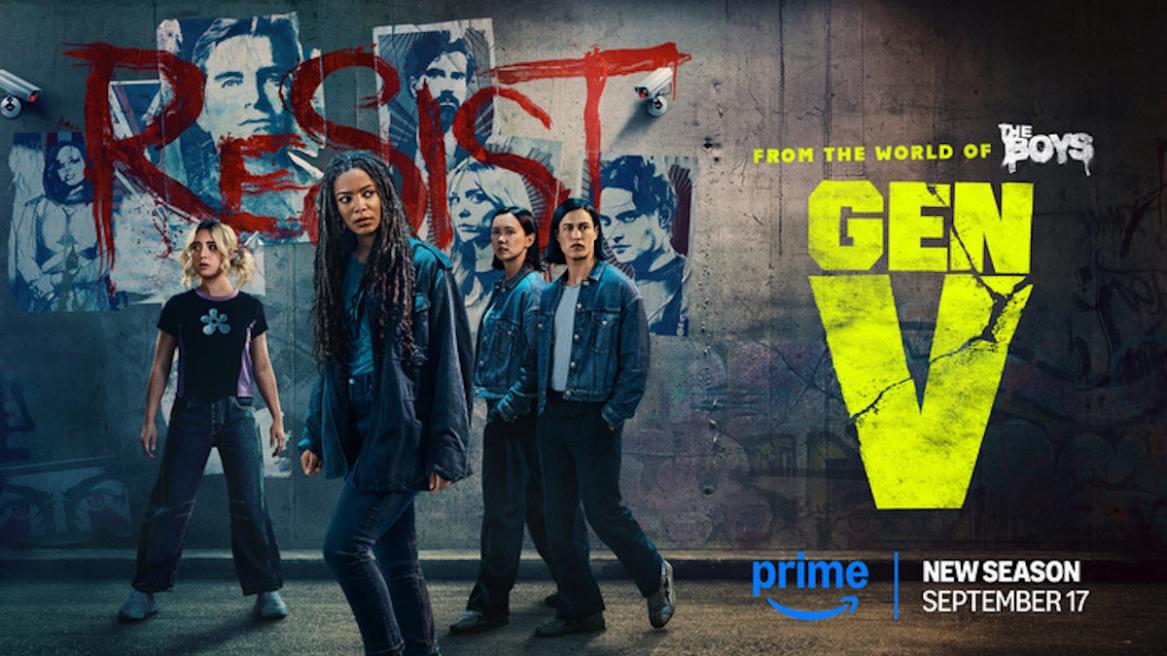Gen V Season 2 Sets Up The Boys Season 5 Climax, Eric Kripke Teases
Gen V Season 2 is poised to arrive soon, and anticipation is at a fever pitch as fans consider how the sophomore run will expand and redefine the relationship between this spinoff and the broader Boys universe. Following the dramatic finale of the first season, attention has shifted to the fate of Marie and her team after their surprising capture by Homelander. The upcoming season promises to tether Gen V more firmly to the world of The Boys, signaling a concerted expansion of the shared universe. In the coming weeks, audiences will see how Gen V’s stories intersect with the overarching saga of The Boys, and how the events on this campus-driven stage may propel the five-season arc that executive producers have hinted could culminate in a major moment for The Boys.
Gen V’s place in The Boys universe deepens in Season 2
Gen V has long operated as a distinct entity, offering a fresh lens on the superpowered world while occasionally nodding to the larger universe that fans already know. Its tone, setting, and cast have allowed it to explore fresh themes, character dynamics, and organizational intrigue in a way that feels both new and familiar. With Season 2, the show is set to lean more into its connections with The Boys, expanding its roots in the shared timeline and story architecture that drive the broader franchise. This shift matters because it reframes Gen V not merely as a separate narrative experiment but as a crucial piece of the ongoing tapestry that includes Homelander, Vought, and the other high-stakes dynamics that have defined the flagship series.
A central point in the preview discourse is the assertion that Gen V Season 2 will actively shape the climactic arc of The Boys Season 5. This is not a mere crossover gimmick or a cameo-forward arrangement; it signals a deliberate strategy to use Gen V as a staging ground for events and revelations that will ripple outward, altering character trajectories and the political calculus of power within the Vought ecosystem. The creators have indicated that, while Gen V maintains its own internal stakes and narrative momentum, it will serve as a conduit—carrying forward plot threads, moral questions, and strategic decisions that will ultimately converge with the main show’s progression. The implication is that what happens at Godolkin University and among the Gen V cohort could become a catalyst or a turning point for the larger conflict and its ultimate resolution in The Boys.
Within this framework, several key elements emerge as drivers of the Season 2 narrative and its connection to The Boys. First, the looming presence of Odessa—teased in the trailers—points to a potentially transformative force that could alter the balance of power for both Gen V and The Boys. Second, Marie Monroe, portrayed by Jaz Sinclair, is being highlighted in promotional material as a standout figure with extraordinary capabilities, described in the trailers as among the strongest supers in play. Her role is poised to become a focal point for questions about strength, leadership, and the nature of control within the villainous and corporate machinery that defines this universe. Finally, the overarching question remains: how will the events seen in the spinoff influence the climactic confrontation that the main series promises to deliver in its fifth season? These threads establish a deliberate, interconnected path forward, making Season 2 a pivotal hinge between the stand-alone identity of Gen V and the broader narrative engine of The Boys.
To appreciate the significance of this cross-pollination, it helps to consider the structural choices behind Season 2. The showrunners are leveraging Gen V’s campus setting and its ensemble cast to explore themes of manipulation, surveillance, and corporate omnipresence with greater granularity than the main series has sometimes afforded. This approach creates opportunities to examine how a generation of supers—formed, trained, and monitored within a highly controlled system—responds to pressure from above and the moral complexities of leadership. At the same time, the storytelling philosophy honors Gen V’s established voice: a blend of dark humor, raw power dynamics, and character-driven ethics that keeps the tone distinct yet resonant with what fans already love about The Boys. The result is a layered narrative where the two programs are not simply adjacent; they are interdependent, each enriching the other by offering deeper context for choices that affect both the separate world on campus and the sprawling, volatile universe of The Boys.
A nuanced expectation from Season 2 is that watchers will witness how the show’s evolving mythology—especially around Odessa—affects strategic decisions across both series. The implication is that the Odessa arc could be the fulcrum on which major plot movements pivot, affecting alliances, betrayals, and the intensity of the conflict between the corporate superstructure and those who resist it. The storytelling logic here emphasizes cause-and-effect relationships: what Gen V reveals or resolves will feed directly into the next stage of The Boys, and vice versa, ensuring that the two programs remain in dialogue with each other. Because the narrative intent is to create a cohesive arc across seasons and series, audiences should expect cross-cutting discoveries, shared threats, and parallel character arcs that illuminate how power operates in this world and what it costs those who challenge it.
In terms of character trajectories, the focus on Marie Monroe’s potential ascent hints at a broader thematic inquiry: what does it mean to possess overwhelming power, and what responsibilities come with it in a world where institutions weaponize talent? The marketing emphasis on Monroe as possibly the strongest supe adds a layer of intrigue—could her strength be the key to unlocking or stopping a sweeping plan? How will her loyalties align as the conflict with Vought’s control mechanisms intensifies? Season 2’s exploration of these questions will likely be woven through action-packed sequences, introspective character moments, and strategic reveals that reframe what fans believed they understood about the characters’ aims, fears, and moral boundaries. These elements contribute to a Season 2 narrative that is not merely about survival or escape but about the delineation between power used for protection, power used for domination, and the moral calculus that determines which path a character chooses under extreme pressure.
To summarize this section, Gen V Season 2 is intentionally positioned to deepen the interconnection with The Boys, shaping the anticipated Season 5 climax while preserving Gen V’s core identity. The teased elements—Odessa, the Marie Monroe arc, and the evolving power dynamics—are designed to create a shared universe where events ripple across both properties, enriching the viewing experience for fans who follow the franchise across multiple fronts. The season’s approach signals a thoughtful expansion rather than a mere cross-promotional stunt, with stakes that are meaningful within Gen V’s own world and consequential for the larger The Boys storyline. As a result, viewers can anticipate a narrative that is at once more integrated and more expansive, inviting audiences to trace cause and effect across timelines, characters, and factions.
Marie Monroe: The strongest supe and her pivotal role
Jaz Sinclair’s Marie Monroe is positioned at the center of Season 2’s character-driven strategy, with early materials underscoring her as a transformative force within the Gen V ecosystem. In the trailer and promotional discourse, Monroe is depicted as possessing capabilities that set her apart even in a universe crowded with formidable supers. The emphasis on her strength—both literal and symbolic—suggests a character whose presence will influence who leads, who follows, and what lines are drawn in the sand as the campus and its surrounding power structures collide. This portrayal invites viewers to reexamine power dynamics from a fresh vantage point: not just who can unleash the most devastating display of power, but who has the strategic sense to wield it in pursuit of a broader, potentially noble, or dangerously corrupt objective.
Monroe’s narrative is likely to intersect with the ethical and operational questions that have always defined this universe: how do institutions cultivate or weaponize talent? What happens when extraordinary abilities collide with moral choices that challenge the expectations of those who fund, regulate, or weaponize supers? The trailer’s labeling of Monroe as “the strongest supe” raises expectations about how her strength will be deployed—whether it becomes a shield for allies, a weapon for enemies, or a catalyst for revelations about the true nature of the projects and experiments driving the superpowered population. As Season 2 unfolds, Monroe’s decisions will be read as a litmus test for the moral philosophy of the Gen V cohort and, by extension, for how the overarching system views power: as a tool to protect, to control, or to redefine the meaning of justice in a world where violence is a form of governance.
Delving deeper into her potential arc, one can predict that Monroe will operate at the fulcrum of several critical tensions. First, there is the conflict between loyalty to peers and loyalty to a cause she judges morally; second, a tension between personal safety and the ethical imperative to resist an oppressive regime that uses science and money to perpetuate domination; and third, a potential pivot from a survivor of a coercive system to a challenger who seeks structural change, either from within or by orchestrating a systemic upheaval. The narrative weave would likely allow her to perform as a strategic leader in moments that require decisive action, while also offering intimate, character-driven scenes that explore her motivations, fears, and sense of responsibility toward those who place their trust in her. Monroe’s presence could catalyze alliances among students who were previously disparate, or it could precipitate conflicts that reveal fractures in the Gen V family, thereby adding texture to the season’s emotional and ethical landscape.
From a storytelling perspective, the Monroe arc serves multiple purposes. It helps anchor Season 2 in concrete emotional stakes—friendships, rivalries, and mentorships—while also providing a platform for high-stakes action sequences that leverage her formidable abilities. Her leadership, decisions, and potential sacrifices will likely influence how other characters navigate the pressures of a system designed to produce and deploy supers for corporate or geopolitical ends. The character’s trajectory can be expected to test themes of power and responsibility, as well as the cost of resistance in a world where authority is monetized, technology-driven, and relentlessly surveilled. For audiences, Monroe represents more than a single power display; she embodies a narrative vehicle through which the show can interrogate what it means to be strong in a world where strength is commodified, weaponized, and evaluated through a perpetual lens of risk and consequence.
In sum, Monroe’s portrayal as a leading figure of significant power signals a Season 2 emphasis on leadership under pressure, moral decision-making under intense scrutiny, and the nuanced human dimensions that accompany extraordinary capacities. The character’s arc is likely to drive central questions about whether strength alone can guarantee justice, what it costs to stand up to a system that rewards obedience, and how a group of young supers might reimagine the balance of power in a landscape dominated by corporate overlords and secret projects. Monroe’s strength, when combined with the other Gen V characters’ growth and the broader context of the shared universe, promises to deliver a gripping, thought-provoking season that remains faithful to the series’ core themes while expanding the emotional and thematic reach of the franchise.
Project Odessa and the larger conspiracy: potential implications for Gen V and The Boys
Odessa has emerged as a pivotal element teased in the Season 2 trailers, with the show’s creators positioning it as a potential fulcrum for major developments across Gen V and The Boys. Although the exact nature of Odessa remains shrouded in mystery, the conventional interpretation of the teaser materials points to Odessa as a project or initiative pursued by Vought that could redefine the scope of supe power, control mechanisms, and the strategic playbook used by the company to uphold its dominance over the market and public perception. The fact that Starlight—one of the most recognizable and morally anchored heroes in the main series—expresses a desire for Odessa to be eliminated adds a layer of legitimacy to the theory that Odessa represents a dangerous pathway toward ultimate supe domination. This tension between the pursuit of unchecked power and the ethical opposition to it creates a dynamic narrative engine capable of driving plotlines across both Gen V and The Boys.
A central question, therefore, is what Odessar symbolically represents beyond a literal project. If Odessa is indeed a key to complete supe domination, then it carries implications that extend to both the immediate survival of the Gen V cohort and the long-running struggle against the corporate and political infrastructures that have shaped the world’s superhero ecosystem. The potential significance of Odessa can be interpreted through several lenses:
- As a technological or genetic program that amplifies or stabilizes superpowers, increasing both the scale and reliability of superhuman capabilities.
- As a strategic apparatus that allows Vought to exert unprecedented influence over societal structures, from media narratives to political outcomes.
- As a catalyst for coalition-building or factional splits within the Gen V environment, exposing fault lines and testing leadership under unprecedented pressure.
The anticipation surrounding Odessa also raises questions about the degree to which Gen V’s own internal dynamics will converge with or resist Odessa’s ambitions. If Gen V’s narrative is moving toward a climactic engagement that mirrors or intersects with The Boys’ final confrontation, Odessa could function as the theoretical and practical bridge between the two series’ existential threats: corporate control, public perception, and the personal autonomy of supers who must decide where their loyalties lie. The interconnected storytelling approach suggests that Odessa will not appear in isolation but will influence choices, alliances, and strategic calculations across the Gen V campus and the broader world of The Boys.
As fans speculate about possible outcomes, several plausible trajectories emerge. Odessa could become a focal point of a coordinated resistance among students who disagree with the program’s aims, presenting a multi-faceted conflict that pits students against executives, researchers, and enforcers who view Odessa as a tool for power consolidation. Alternatively, Odessa could be weaponized by antagonistic factions within Vought or external powers seeking to manipulate the market and political climate to their advantage. In either scenario, Odessa’s presence would intensify the stakes by offering a tangible test case for the moral choices faced by supers and the humans who command them, and by providing a concrete, scale-enhancing threat that necessitates new forms of collaboration and courage.
Importantly, Odessa’s role is not isolated from the core questions the series has always explored: what happens when power outpaces accountability, how do individuals respond to the lure of absolute control, and what sacrifice is required to preserve agency and humanity in a world where the line between heroism and exploitation is continually blurred? The on-screen exploration of these questions through Odessa promises to deliver not only adrenaline-fueled sequences but also a lucid, morally charged examination of governance, surveillance, and the human cost of corporate ambitions. As Season 2 unfolds, audiences should expect Odessa to reveal a landscape where the stakes are higher, the consequences more severe, and the narrative momentum toward The Boys’ forthcoming climax intensified by new information, alliances, and the strategic gambits of characters who have long inhabited the periphery of power.
A final note on the Odessa storyline: the expectation is that this arc will be revealed gradually, with revelations that recalibrate what viewers understand about the nature of power in this universe. The careful pacing of clues, the layering of motives among different factions, and the interplay between personal loyalties and larger political objectives will be essential to sustaining tension and engagement across Gen V’s episodes and beyond. The Season 2 narrative plan appears designed to interlace Odessa’s implications with the evolving arcs of Marie Monroe, the Gen V ensemble, and the broader ambitions of The Boys, crafting a cohesive, multi-threaded storyline that invites viewers to follow every twist and turn as the season progresses toward a possibly game-changing culmination.
What Season 2 implies for the broader universe: release, cast, and narrative continuity
As the release window approaches, the practical elements of Season 2—such as casting continuity, returning characters, and the introduction of new players—receive heightened attention from fans and critics alike. The show’s returning talent pool is expected to bring continuity to the Gen V universe while integrating fresh perspectives that push the overarching narrative forward. The ensemble dynamics, particularly in a setting that juxtaposes camaraderie and competition, will be essential to the season’s emotional core and its ability to deliver both character-driven and action-heavy storytelling. The balance between established relationships and new allegiances will likely shape how audiences perceive the characters’ growth and the stakes they face in a world where power, greed, and moral compromise intersect.
In terms of the broader universe, Season 2’s connective tissue with The Boys is expected to deepen to a degree that affects interpretive frameworks around both series. Viewers who have followed The Boys from its inception will recognize the incremental expansion—a trend that has characterized the franchise’s approach to cross-series storytelling. The pacing and narrative architecture will presumably allow the two programs to inform each other’s events, with Gen V offering granular, character-centric explorations of power and resistance, while The Boys amplifies macro-level political and corporate machinations. This reciprocal influence can produce a more cohesive long-term arc, offering fans a richer, more integrated experience as the universe evolves toward its culminating moments.
The production and release strategy, as indicated by industry patterns and insider commentary, suggests a commitment to high production values, tight editorial control, and a pace that sustains suspense over multiple episodes. The return of familiar faces, alongside newly introduced figures who bring unique abilities and perspectives, is likely to contribute to a layered, kaleidoscopic narrative. The storytelling approach may also emphasize tone variation, moving between sharp, satirical commentary on power structures and intense, character-driven scenes that probe the personal costs of living in a world where heroes and villains blur into the same spectrum of influence. This dual focus aligns with the franchise’s strengths: combining provocative social critique with gripping entertainment, all while maintaining the distinctive voice that has defined Gen V and The Boys across seasons.
From a thematic standpoint, Season 2 appears poised to explore core questions about the price of power, the ethics of experimentation, and the resilience of human agency in a system designed to extract, refine, and monetize extraordinary abilities. The dynamic between those who seek to reform or resist the status quo and those who profit from its perpetuation will likely drive much of the season’s tension and drama. The interplay of personal loyalties, institutional pressures, and the lure of dominance provides fertile ground for dramatic revelations, character transformations, and emotionally resonant moments that can broaden the franchise’s appeal to existing fans while inviting new viewers into a complex, multi-layered universe.
As the narrative threads converge toward a planned culmination in The Boys’ fifth season, Season 2’s outcomes will be examined for their predictive value about the franchise’s ultimate trajectory. The extent to which Gen V can stand on its own while still serving as a reliable conduit for the main series’ critical beats will be a key metric of success. Fans will be watching for how the season balances its own internal stakes with the expectations of a larger, serialized arc that has defined both shows’ reputations for audacious storytelling, moral complexity, and uncompromising examinations of power, control, and resistance. The potential for cross-series payoff—where events, discoveries, and character decisions in Gen V reverberate through The Boys with tangible consequences—offers a compelling incentive to engage deeply with Season 2 and its evolving narrative landscape.
Conclusion
Gen V Season 2 is framed as a pivotal chapter that not only advances its own distinctive storylines but also intensifies the interconnections with The Boys universe. The emphasis on Marie Monroe’s emergence as a central figure, the exploration of Project Odessa as a possible engine of supreme power, and the broader intent to shape The Boys Season 5’s climactic arc illustrate a deliberate strategy to create a cohesive, multi-series narrative experience. The season promises to deliver a blend of high-stakes action, character-driven drama, and moral inquiry that aligns with the franchise’s long-standing identity while expanding its scope and complexity. Fans can anticipate a Season 2 that deepens the franchise’s central themes—power, responsibility, resistance, and the costs of governance by corporate and political forces—through a carefully constructed framework designed to pay off in meaningful ways across both Gen V and The Boys. The coming episodes are poised to reveal not only who the heroes and villains will become but also how a new generation of supers will redefine the balance of power in a world where oversight is fractured and ambition knows no bounds.



